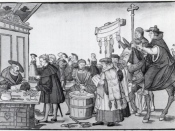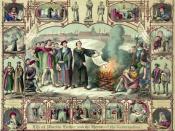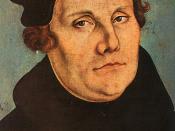The protestant reformation was primarily an economic event because the entire idea of reforming the church started with the validity of the sale of indulgences. Indulgences were purely for economic gain when it came to the catholic church. Because of this sale of indulgences protestants and other anti-pope figures such as Savonarola, Hus, Wycliffe, and Luther, began speaking out of the corruptions and abuses of the church. It it was for the sale of indulgences (purely economic) there would be no reason for the reformation.
The sale of indulgances went on for a long while. They were peddled everywhere. They were sold for several reasons, such as funding crusades, pope pocket money, feed the humanistic tasts of the pope. The people recieved salvation, were excused from all sin and future sin and guaranteed a seat in heaven. Basically a form of religious taxation, the church began raking in enormous amounts of money.
The Catholic heirarchy alone owned 75% of all the money in France, and 50% of the wealth in Germany. Besides the sale of indulgances clergymen began selling titles, positions, offices, etc. to rake in even more money. The most famous peddler of indulgances was Archbishop Tetzel, who traveled from town to town, especially throughout Germany, (Wittenburg)T hough by this time the "special sale of indulgances" had gone under way. This indulgance gave you complete absolution from all sins, and treatment for future sins. That would definetly guarantee you a spot in heaven. The money from the sale of these indulgances was going to pay for the rebuilding of St. Peter's Basilica. He gained the attention of Martin Luther, the founder of the protestant revolution, and he attacked Tetzel, and challenged the sale of indulgances. Luther was angered at this. He posted up his 95 theses at Wittenberg...


